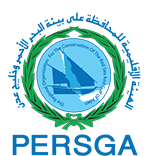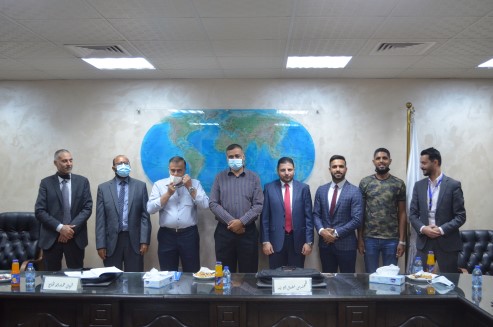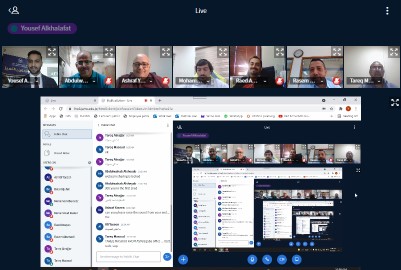Training Workshop in Jordan– Introduction to Marine Biofouling: Impacts and Management of Risks
Under the framework of the GEF-UNDP-IMO GloFouling Partnerships project to tackle invasive aquatic species worldwide, in cooperation with the International Maritime Organization (IMO), the Jordan Academy for Maritime Studies (JAMS) and the Aqaba of Special Economic Zone Authority (ASEZA), the Regional organization for the Conservation of the Environment of the Red Sea and the Gulf of Aden (PERSGA) have co-organized a hybrid training course entitled “Introduction to Marine Biofouling: Impacts and Management of Risks” hosted by JAMS, allowing in-person and online participation. For the online delivery of the training, JAMS online platform communication (O-JAMS) software was used. The training was held from 26 to 27 September 2021 in the Premises of JAMS in Amman -Jordan.
The hybrid event was carried out under IMO’s Integrated Technical Cooperation Programme (ITCP) framework as well as the GEF-UNDP-IMO GloFouling Partnerships Project which aims to build capacity in participating countries in the region for implementing the IMO Biofouling Guidelines and other relevant guidance and best practices for biofouling management and to catalyse overall reductions in the transfer of Invasive Aquatic Species (IAS) introduced by marine biofouling with additional benefits in reducing the Greenhouse Gas emissions from global shipping.
PERSGA representative provided an opening remark on behalf of PERSGA´s Secretary-General, H.E. Prof. Dr. Ziad Abu Ghararah, and thanked all participants for their presence. He reminded the participants that the PERSGA region is a major global passageway for maritime transport, thus exposed to a high risk of introduction of IAS, the impact that the spread of IAS could have on the PERSGA region, which is extremely rich in biodiversity, rendering it a global conservation value and the dependence of the countries of the region on the coastal and marine environments as a key element in economic development, including coastal fisheries, tourism, maritime industry, and other activities.
This training course was aimed at delivering a pilot training course on biofouling management by the national training institution nominated by Jordan, the Jordan Academy of Maritime Studies (JAMS). The participants were also provided with updates on the initiative undertaken at the regional level and an overview on the role of the Regional Organization (PERSGA) to run this project in the Red Sea and Gulf of Aden region, where four countries namely: Jordan, Sudan, Djibouti, and Somalia, participate in this project.
The training course package on biofouling management was delivered by a JAMS’s instructor.
The training course programme contained a series of technical presentations on the various aspects of the GloFouling Project, topics related to Biofouling− factors influencing biofouling, the environment eco-benefits, the reactive and preventive measures to tackle the introduction of the Invasive Aquatic Species and the IMO voluntary Guidelines adopted in 2011. Quizzes type of questions following presentations were also provided.
Among the participants were representatives of various maritime sectors, including Aqaba ports and Maritime affairs Authorities.
The training course held for the national stakeholders in Jordan was a valuable opportunity to raise awareness on the marine biofouling issues and how best to tackle the introduction of the biofouling-mediated IAS.
Moreover, PERSGA representative took this opportunity to hold a short meeting with the National Focal Point (Mr. Neidal Abuzeid from JMC) and the selected team leader of experts (Mr. Ehab Eid) to discuss the implementation of the GloFouling project activities in Jordan.































